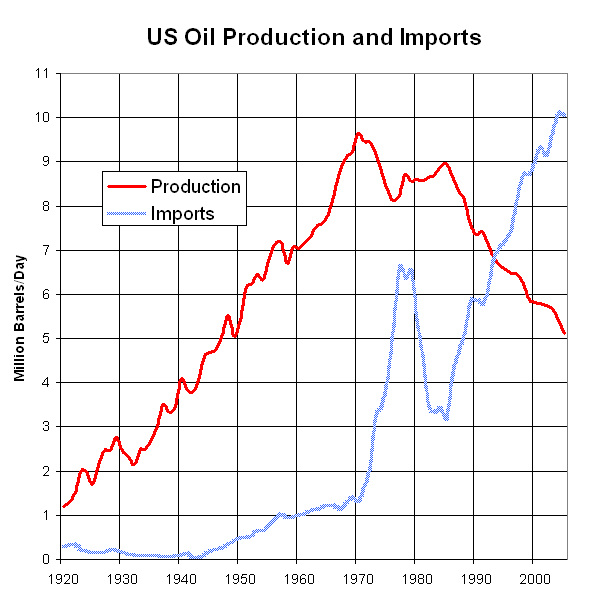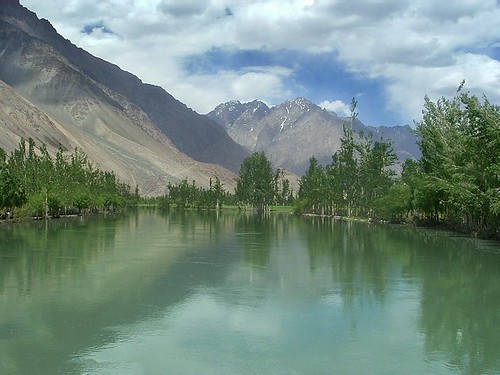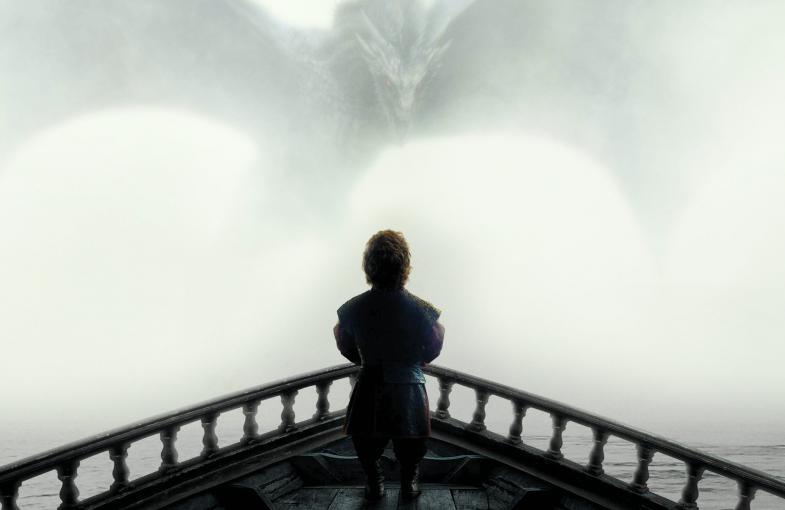The American way of life – which is now virtually synonymous with suburbia – can run only on reliable supplies of dependably cheap oil and gas. Even mild to moderate deviations in either price or supply will crush our economy and make the logistics of daily life impossible. – Jim Kunstler – The Long Emergency


Here we stand
Like an Adam and an Eve
Waterfalls
The Garden of Eden
Two fools in love
So beautiful and strong
The birds in the trees
Are smiling upon them
From the age of the dinosaurs
Cars have run on gasoline
Where, where have they gone?
Now, it’s nothing but flowers
Talking Heads – Nothing but Flowers
America was a Garden of Eden with nothing but flowers, trees and vegetation. We bit into the forbidden fruit of oil over a century ago. It has been a deal with the Devil. Oil brought immense wealth, rapid industrialization, 2.7 million miles of paved roads, and enormous power to America. But, now the SUV is running on empty. In the not too distant future the downside of the deal with the Devil will reveal itself. America was the land of the free and home of the brave. Now it is the land of the Range Rover and home of the BMW. In a few years it could be the land of the forlorn and home of the broken down. Our entire society has been built upon a foundation of cheap oil. The discovery of oil in Titusville, PA in 1859 turbo charged the Industrial Revolution in the U.S. The development of our sprawling suburban culture was dependent upon cheap oil. Americans could not survive for a week without oil. Commerce in the U.S. depends upon long haul truckers. Food is transported thousands of miles to grocery stores. The cheap Wal-Mart crap is transported thousands of miles across the seas from China. Americans believe it is our God given right to cheap oil. We are the chosen people. Kevin Phillips, in his brilliant book American Theocracy describes our love affair with cheap oil:
Americans constitute the world’s most intensive motoring culture. For reasons of history and past abundance, no other national population has clumped so complacently around so fuelish a lifestyle. For many citizens the century of oil has brought surfeit: gas-guzzling mobile fortresses, family excursions on twenty thousand-thousand-gallons-per-hour jet aircraft, and lavishly lit McMansions in glittering, mall packed exurbs along outer beltways. Against a backdrop of declining national oil and gas output, Americans consume 25% of world energy while holding just 5% of its energy resources. As the new century began, Americans enjoyed a lifestyle roughly twice as energy intensive as those in Europe and Japan, some ten times the global average. Of the world’s 520 million automobiles, unsurprisingly, more than 200 million were driven in the United States, and the U.S. car population was increasing at five times the rate of the human population. How long that could continue was not clear.
John and Jane Q. Citizen mostly ignore these trends and details, and know nothing of geologist Hubbert’s bell-shaped charts of peak oil. Senior oil executives sometimes discuss them in industry conferences, but elected officials – many with decades of energy platitudes under their belts – typically shrink from opening what would be a Pandora’s Box of political consequences. Oil was there for our grandfathers, they insist, and it will be there for our grandchildren; it is part of the American way.
Ignoring the facts and pretending that we can count on cheap oil for eternity is delusional. It is also the American way. The age of oil is coming to an end.




There are consequences to every action. There are also consequences to every inaction. Over the next decade Americans will experience the dire consequences of inaction. The implications of peak cheap oil have been apparent for decades. The Department of Energy was created in 1977. The Department of Energy’s overarching mission was to advance the national, economic, and energy security of the United States. In 1970, the U.S. imported only 24% of its oil. There were 108 million motor vehicles in the U.S., or .53 vehicles per person in the U.S. Today, the U.S. imports 70% of its oil and there are 260 million vehicles, or .84 vehicles per person. Jim Kunstler describes our bleak future in The Long Emergency:
“American people are sleepwalking into a future of hardship and turbulence. The Long Emergency will change everything. Globalism will wither. Life will become profoundly and intensely local. The consumer economy will be a strange memory. Suburbia – considered a birthright and a reality by millions of Americans – will become untenable. We will struggle to feed ourselves. We may exhaust and bankrupt ourselves in the effort to prop up the unsustainable. And finally, the United States may not hold together as a nation. We are entering an uncharted territory of history.”
The land of the delusional has no inkling that their lives of happy motoring are winding down. The vast majority of Americans believe that oil is abundant and limitless. Their leaders have lied to them. They will be completely blindsided by the coming age of hardship.
Factories & Shopping Malls




There was a factory
Now there are mountains and rivers
you got it, you got it
We caught a rattlesnake
Now we got something for dinner
we got it, we got it
There was a shopping mall
Now it’s all covered with flowers
you’ve got it, you’ve got it
If this is paradise
I wish I had a lawnmower
you’ve got it, you’ve got it
Talking Heads – Nothing but Flowers
If Americans had any sense of history longer than last week’s episode of Dancing with the Stars (how about that Bristol Palin!), they may have noticed that the modern age has lasted a mere 150 years and has been completely dependent upon cheap plentiful oil. This is a mere eye blink in the history of mankind. American exceptionalism refers to the opinion that the United States is qualitatively different from other nations. Its exceptionalism is claimed to stem from its emergence from a revolution, becoming “the first new nation” and developing “a unique American ideology, based on liberty, egalitarianism, individualism, populism and laissez-faire”. This feeling of superiority stems from the belief that we have a moral superiority and God has chosen our country to be a shining symbol for the rest of the world. It is the ultimate in hubris to think that we are the chosen ones. An enormous amount of credit for the American Century (1900 – 2000) must be given to pure and simple luck.
Everything characteristic about the condition we call modern life has been a direct result of our access to abundant supplies of cheap fossil fuels. Fossil fuels have permitted us to fly, to go where we want to go rapidly, and move things easily from place to place. Fossil fuels rescued us from the despotic darkness of the night. They have made the pharaonic scale of building commonplace everywhere. They have allowed a fractionally tiny percentage of our swollen populations to produce massive amounts of food. All of the marvels and miracles of the twentieth century were enabled by our access to abundant supplies of cheap fossil fuels. The age of fossil fuels is about to end. There is no replacement for them at hand. These facts are poorly understood by the global population preoccupied with the thrum of daily life, but tragically, too, by the educated classes in the United States, who continue to be by far the greatest squanderers of fossil fuels. – Jim Kunstler – The Long Emergency
Every accomplishment, invention, and discovery of the 20th Century was due to cheap accessible fossil fuels. The American industrial age was powered by cheap plentiful oil. One hundred and ten years after the discovery of oil in Titusville, PA an American walked on the moon. We harnessed the immense power of oil and rode it hard. An empire was born and grew to the greatest in history through the utilization of oil and oil byproducts. It is no coincidence that U.S. GDP has been dependent upon the growth in fossil fuel consumption over the last 150 years.

The self centered delusional myopic American citizenry see no parallel between the American Empire built on a foundation of oil and the Dutch Empire built upon wind and water or the British Empire established on the discovery of vast quantities of coal. The Dutch Empire of the 1600s had 6,000 ships and 1,000 windmills generating power. The British Empire used coal to power steam engines, pumps, locomotives and ships and forged a great empire in the 1700s and 1800s. Today, the Netherlands has a GDP lower than Mexico. The U.K. has a GDP on par with Italy. You can be sure you are no longer an empire when your GDP is on par with Mexico and Italy. The United States has grown its GDP to $14.7 trillion by exploiting fossil fuels. The American Empire is clearly waning as its dependence on foreign oil slowly bankrupts the country. We consume 140 billion gallons of gasoline every year keeping our suburban sprawl mall based lifestyle viable.
Cars, Highways & Billboards


Years ago
I was an angry young man
I’d pretend
That I was a billboard
Standing tall
By the side of the road
I fell in love
With a beautiful highway
This used to be real estate
Now it’s only fields and trees
Where, where is the town
Now, it’s nothing but flowers
The highways and cars
Were sacrificed for agriculture
I thought that we’d start over
But I guess I was wrong
Talking Heads – Nothing but Flowers
Americans believe our ingenuity, brilliance and blessings from God have led to the elevation of our country to eminence as the greatest empire in history. But, in reality it was due to a black sticky substance that we stumbled across in 1859. Those who believe in American Exceptionalism scoff at the idea that our empire would not exist without oil. They prefer to ignore and downplay the impact of oil on our society. Too bad. Here are the facts from www.lifeaftertheoilcrash.net/.
- Approximately 10 calories of fossil fuels are required to produce every 1 calorie of food eaten in the US.
- Pesticides and agro-chemicals are made from oil.
- Commercial fertilizers are made from ammonia, which is made from natural gas.
- Most farming implements such as tractors and trailers are constructed and powered using oil-derived fuels.
- Food storage systems such as refrigerators are manufactured in oil-powered plants, distributed using oil-powered transportation networks and usually run on electricity, which most often comes from natural gas or coal.
- The average piece of food is transported almost 1,500 miles before it gets to your plate.
- In addition to transportation, food, water, and modern medicine, mass quantities of oil are required for all plastics, all computers and all high-tech devices.
- The construction of an average car consumes the energy equivalent of approximately 20 barrels of oil.
- The construction of the average desktop computer consumes ten times its weight in fossil fuels.
- According to the American Chemical Society, the construction of single 32 megabyte DRAM chip requires 3.5 pounds of fossil fuels.
- Recent estimates indicate the infrastructure necessary to support the internet consumes 10% of all the electricity produced in the United States.
- The manufacturing of one ton of cement requires 4.7 million BTUs of energy, which is the amount contained in about 45 gallons of oil.
Our entire civilization will collapse in a week without oil. Try to imagine life if the 159,000 gas stations in the country ran dry. We are running on fumes and refuse to acknowledge that fact. We sooth our psyche with delusions of green energy (solar, wind, ethanol); drill, drill, drill mantras; abiotic oil theories; and vast quantities of shale gas. The concept of energy required to extract an amount of energy completely goes over the head of media pundits and those who prefer not to think. If you expend 2 gallons of gasoline in your effort to extract 1 gallon of gasoline, you’ve hit the wall. We have sacrificed our future in order to maximize our present, as William James concluded in the late 1800s:
“The most significant characteristic of modern civilization is the sacrifice of the future for the present, and all the power of science has been prostituted to this purpose.”
Americans have a fatal character flaw of desiring others to think they are successful because they drive an expensive gas guzzling automobile and reside in an immense energy intensive McMansion in suburbs 30 miles from civilization. Delusional Americans have convinced themselves that the appearance of success is success. Leasing $50,000 BMWs for decades and borrowing $500,000 to live in a $300,000 house has already pushed millions of egotistical to the edge. Of the 250 million passenger vehicles on the road today, 100 million are SUVs or pickup trucks. The average fuel mileage is 17 mpg. Approximately 70% of Americans drive to work every day, with 85% driving alone. They spend 45 minutes on average commuting to and from work and drive 15 miles to work. The average home size increased from 1,400 sq ft in 1970 to 2,300 sq ft today, despite the fact that the average household size decreased from 3.1 to 2.6. The bigger is better fantasy will be devastating on the downward slope of peak oil.
Pizza Huts, Dairy Queens & 7 Elevens




Once there were parking lots
Now it’s a peaceful oasis
you got it, you got it
This was a Pizza Hut
Now it’s all covered with daisies
you got it, you got it
I miss the honky tonks,
Dairy Queens, and 7-Elevens
you got it, you got it
And as things fell apart
Nobody paid much attention
you got it, you got it
Talking Heads – Nothing but Flowers
How will Americans survive without the 7,500 Pizza Huts, 5,000 Dairy Queens, and 8,000 7-11s that dot our highways? The average Joe is so busy tweeting, texting, and face-booking on their iPads, Blackberries, and laptops, watching Dancing With the Stars on their 52 inch HDTV bought on credit, or cruising superhighways in their leased Hummers to one of the 1,100 malls or 46,000 shopping centers, that they haven’t paid much attention as peak oil crept up on them. The globalization miracle of cheap goods produced in China and shipped across the world by cargo ship and then trucked thousands of miles to your local Wal-Mart is wholly reliant upon cheap oil. Our own military has concluded that:
By 2012, surplus oil production capacity could entirely disappear, and as early as 2015, the shortfall in output could reach nearly 10 MBD. – Joint Operating Environment Report
When worldwide oil demand slightly exceeded worldwide oil supply in 2008, prices surged to $145 per barrel. A 10 million barrel per day shortfall is unfathomable by the purposefully ignorant masses. The sprawling suburbia that now houses the American population will become not viable when oil prices rise above $200 per barrel. Out-of-town shopping and entertainment malls will be deserted. The prosperity borne from the advent of oil is waning. Jim Kunstler explains the end game in The Long Emergency:
The entropic mess that our economy has become is in the final blow-off of late oil-based industrialism. The destructive practices known as “free market globalism” were engendered by our run-up to and arrival at the world oil production peak. It was the logical climax of the oil “story”. It required the breakdown of all previous constraints – logistical, political, moral, cultural – to maximize the present at the expense of the future, and to do so for the benefit of the very few at the expense of the many. Even mild to moderate deviations in either price or supply [of oil and gas] will crush our economy and make the logistics of daily life impossible.
The United States is already tottering, as the oligarchy of the Wall Street banking syndicate, global mega-corporations and corrupt political hacks in Washington DC have pillaged the wealth of the country and left a middle class gasping for air. The mood of the country is already darkening as The Fourth Turning gathers steam. The recognition by the masses that peak cheap oil is a fact will contribute greatly to the next stage of this Crisis. Fourth Turning periods always lead to war. American troops are not in the Middle East to spread democracy. They are the forward vanguard in the coming clash over depleting oil resources. We are entering an era of strife, war, chaos and destruction. The facts of who controls oil supply and who needs oil (U.S. – 25%, China – 10%) are clear. Kunstler bluntly deals with the facts:
Fossil fuel reserves are not scattered equitably around the world. They tend to be concentrated in places where the native peoples don’t like the West in general or America in particular, places physically very remote, places where we realistically can exercise little control (even if we wish to). The decline of fossil fuels is certain to ignite chronic strife between nations contesting the remaining supplies. These resource wars have already begun. There will be more of them. They are very likely to grind on and on for decades. They will only aggravate a situation that, in and of itself, could bring down civilizations. The extent of suffering in our country will certainly depend on how tenaciously we attempt to cling to obsolete habits, customs, and assumptions – for instance, how fiercely Americans decide to fight to maintain suburban lifestyles that simply cannot be rationalized any longer. – Jim Kunstler – The Long Emergency
Mr. Kunstler believes that the U.S. will be forced to downscale, localize and adapt to a new reality. I wholly support his attempt to warn the American people and would urge those who chose to think that preparing for a more agrarian lifestyle that will be forced upon us by circumstances is essential. No technological miracle will save us from our fate. Decades of inaction will have a price. I truly hope that his optimism that hardship will renew the American spirit will reveal itself:
“But I don’t doubt that the hardships of the future will draw even the most secular spirits into an emergent spiritual practice of some kind.”
As I live in the outer suburbs and commute 30 miles per day into the decrepit decaying city of Philadelphia every day, I’m less optimistic that the transition will be smooth or even possible. Kunstler’s view of the suburbs is accurate:
“The state-of-the-art mega suburbs of recent decades have produced horrendous levels of alienation, loneliness, anomie, anxiety, and depression.”
Families stay huddled in their McMansions, protected from phantoms by state of the art security systems. Their interaction with the world is through their electronic gadgets. Neighborhoods of cookie cutter 4,000 sq ft mansions appear deserted. Human interaction is rare. Happiness is in short supply. As I sit in miles of traffic every morning during my soul destroying trek to work I observe the thousands of cars, SUVs, and trucks and wonder how this can possibly work when the peak oil tsunami washes over our society in the next few years. Then I reach the bowels of the inner city and my pessimism grows. This concrete jungle is occupied by hundreds of thousands of uneducated, unmotivated, wards of the state. They live a bleak existence in bleak surroundings and depend upon subsistence payments from the depressed suburbanites to keep them alive. How will they survive in a post peak oil world? They won’t.
The Hirsch Report and Jim Kunstler’s The Long Emergency both were published in 2005. M. King Hubbert warned U.S. leaders decades in advance about the expected timing of peak oil. The warnings have fallen on deaf ears. We were busy with our wars of choice, home price wealth, gays in the military, and the latest episode of Jersey Shore.
And as things fell apart
Nobody paid much attention


























